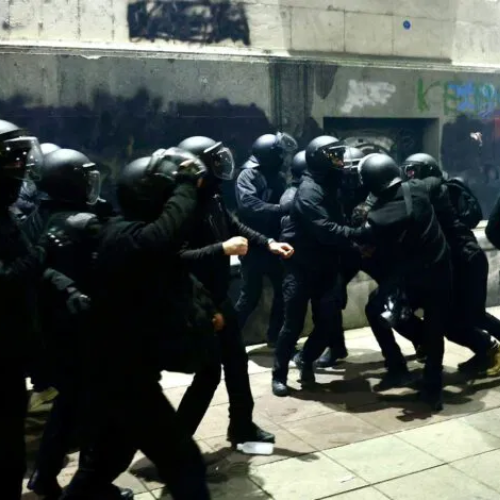Poland has taken a bold step by banning eight officials from Georgia from entering its country. This decision was made because of what Poland described as these officials’ role in “intensifying repression against the opposition” in Georgia. The Polish Foreign Ministry shared this news on social media, making it clear that Poland still stands by the people of Georgia who want to join the European Union and live in a free, democratic country.
Even though Poland announced the sanctions, it did not reveal the names of the eight individuals. Still, the move sends a strong message. Poland is saying that actions against peaceful protesters and opposition voices will not be ignored.
This move follows similar actions by three other European Union countries—Estonia, Latvia, and Lithuania. Just a few days ago, Lithuania released a list of 102 people from Georgia who are no longer welcome, including government workers, police officers, and judges. All of them are believed to have played a role in silencing people who were protesting peacefully.
Canada’s New Air Mission Targets North Korea’s Sanctions Violations
The Polish government has clarified it that it supports the people of Georgia who are fighting for a more democratic and fair future.
Long-Running Protests and Rising Anger
Protests in Georgia have been going on for more than two years. People are angry at the country’s ruling party, called Georgian Dream. Many citizens feel that this party is pushing Georgia closer to Russia and away from the European Union. Georgia has been trying to become part of the EU for years, and many people are afraid that dream is slipping away.
Back in 2023, the ruling party introduced a law that targeted people and groups who receive money from outside the country. Critics said this law was copied from similar rules in Russia. It made many people feel that their voices were being shut down. As a result, thousands of people went out to protest in the streets.
In 2024, the same law came back, and the protests started all over again. Then, after elections in November that many said were unfair, Georgia’s government stopped the process of trying to join the EU. This made people even angrier. More protests broke out, and again, the government reacted harshly.
Reports of Brutal Tactics and Europe’s Reaction
Groups that defend human rights have reported very serious actions by Georgia’s police and security forces. According to these groups, peaceful protesters have been beaten, tortured, and arrested without reason. The way police have handled the crowds has been called “brutal” by Human Rights Watch, an international rights group. These aren’t just violent criminals being arrested—many of the people taken in are regular citizens who were simply holding signs or shouting slogans in support of democracy.
Mexican Cartel La Nueva Familia Michoacana Caught in U.S. Sanctions Storm
The situation has worried many countries in Europe. In late 2024, three big EU countries—Poland, France, and Germany—joined together to speak out. They said they strongly oppose the violence being used against peaceful protesters, journalists, and leaders who are not part of the ruling party.
However, not every country in the EU agrees on what should be done. When the European Union tried to punish Georgian officials as a group, the effort was blocked by two countries—Hungary and Slovakia. Both of those countries have leaders who are seen as friendly to Russia and did not support taking action against Georgia.
Because of that, some countries like Poland have decided to act on their own. They are sending a message that violence and threats against peaceful people have no place in a country that wants to join the EU.
Poland’s ban on the eight officials is just the latest move in this growing conflict between the Georgian government and its people. More countries may follow, but for now, Poland has made it clear that it is standing with the people and not those who use force to stay in power.


